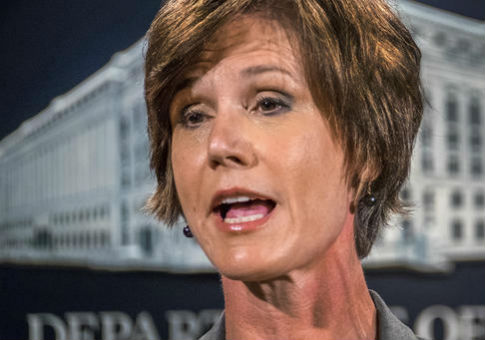Former Acting Attorney General Sally Yates is scheduled to testify May 8 before a Senate judiciary investigation into Russia's interference in the 2016 presidential election.
Yates, who served as deputy attorney general in the Obama administration and acting Justice Department chief during the first days of Donald Trump's presidency, will appear before the Senate Judiciary Subcommittee on Crime and Terrorism, led by Republican Sen. Lindsey Graham (S.C.).
The ex-Justice Department official will testify before the panel on Russia's meddling in last year's election, in what would be her second appearance before Congress in a week. She has also been invited to appear before the House Intelligence Committee on May 2 in a public hearing.
Former Director of National Intelligence James Clapper will testify at the Senate hearing alongside Yates.
Yates was expected last month to tell lawmakers about phone calls between President Donald Trump's former national security adviser, Michael Flynn, and Russian Ambassador to the U.S. Sergey Kislyak, but never testified. The hearing was postponed by Rep. Devin Nunes (R., Calif.), chairman of the House Intelligence Committee. Nunes later recused himself from the House's ongoing investigation into Russia's election interference after he became the subject of a House ethics probe for revealing incidental collection of Trump aides by the intelligence community.
Last month, the Trump administration denied a Washington Post report that it tried to block Yates from appearing before Congress.
"The White House has taken no action to prevent Sally Yates from testifying and the Department of Justice specifically told her that it would not stop her and to suggest otherwise is completely irresponsible," White House Press Secretary Sean Spicer said at the time.
Trump fired Yates in January after she told Justice Department lawyers not to defend the president's executive order halting the Syrian refugee program and temporarily barring citizens of seven Muslim-majority countries from entering the United States over terrorism concerns.
